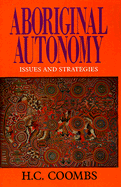Book contents
- Frontmatter
- Contents
- Foreword by Michael Dodson
- Preface
- Acknowledgments
- The Aboriginal World View
- Aborigines and the Land
- Aboriginal Lifestyles
- Aborigines, Resources and Development
- Aborigines, Law and the State
- Asserting Autonomy: Recent Aboriginal Initiatives
- The Recognition of Native Title
- 17 The Mabo decision: a basis for Aboriginal autonomy?
- Conclusion
- Appendix: The Eva Valley Statement
- References
- Select Bibliography of work by H.C. Coombs
- Index
17 - The Mabo decision: a basis for Aboriginal autonomy?
Published online by Cambridge University Press: 03 May 2011
- Frontmatter
- Contents
- Foreword by Michael Dodson
- Preface
- Acknowledgments
- The Aboriginal World View
- Aborigines and the Land
- Aboriginal Lifestyles
- Aborigines, Resources and Development
- Aborigines, Law and the State
- Asserting Autonomy: Recent Aboriginal Initiatives
- The Recognition of Native Title
- 17 The Mabo decision: a basis for Aboriginal autonomy?
- Conclusion
- Appendix: The Eva Valley Statement
- References
- Select Bibliography of work by H.C. Coombs
- Index
Summary
FROM TERRA NULLIUS TO EXTINGUISHMENT
In 1983, when writing in support of the need for a treaty between the Australian Government and Aboriginal peoples, I noted that in Australia, ‘the prevailing legal view has been that native title did not exist’ and that ‘the issue has not yet been dealt with effectively in the High Court’ (see Chapter 13). I argued strongly that only such a judgement ‘would give security’ to Aborigines and that ‘it is vital that this matter be resolved’. Some ten years later the High Court made such an historic decision in respect to the Mabo case put to it by the Meriam people of Mer Island in the Torres Strait. It is a moot point, however, as to whether this judgement and the national legislation subsequently presented by the Commonwealth Government will provide either the land rights or the political and cultural autonomy that Aboriginal people have long sought.
The High Court judgement was handed down in June 1992 and received a favourable initial response from Aboriginal people, the Prime Minister and much of the public and media. A valuable analysis of the judgement by Professor Garth Nettheim (1992) of the University of New South Wales incorporates a useful summary by Justice Brennan of the present state of Australian law relating to Aboriginal land rights and refers also to changes in the historical foundations of Australian law affecting Aborigines.
- Type
- Chapter
- Information
- Aboriginal AutonomyIssues and Strategies, pp. 200 - 218Publisher: Cambridge University PressPrint publication year: 1994



